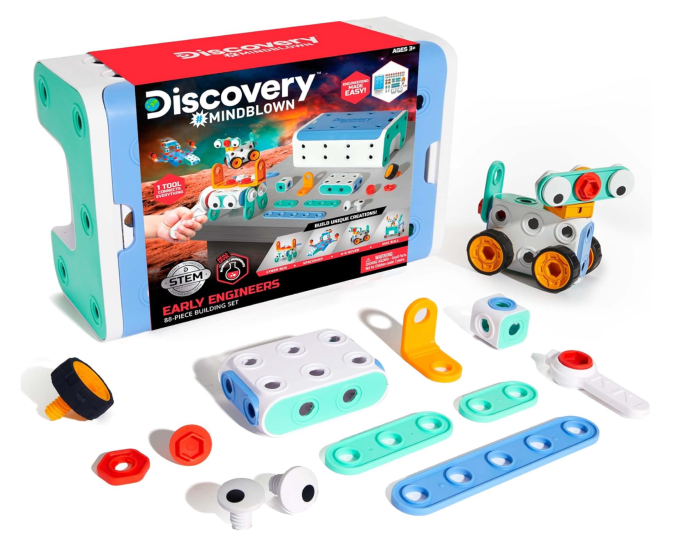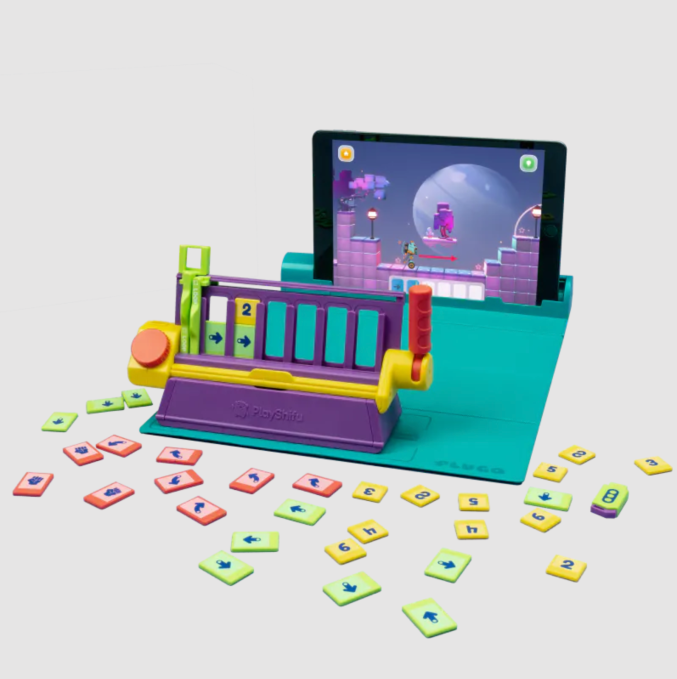There’s no doubt the STEM toys category has lost a bit of its magic. The hype that started about a decade ago, powering a wave of startups to launch creative and experimental products — pitching parents on dedicated connected hardware and apps to help unlock their kids’ future tech career progression — has faded to something a bit less flashy and ambitious. What’s left is a broad sense that kid-friendly kit is just a piece of a larger learning puzzle. And products alone won’t cast an unbreakable spell. But maybe they can help?
The focus of remaining players has shifted too. Since our last dive into this techie toy box, a number have winked out of existence entirely — or look as if they’re about to judging by mothballing of remaining efforts around existing (old) products. But the main direction of travel is pivots to the formal education market. Which means there’s less effort and attention on home users as product builders fix on the (serious) business of serving curriculum-aligned content and interfaces for schools. (The growing list of startup pivots to edtech includes the likes of imagi Labs, Osmo, Ozobot, MakeBlock, pi-top, robo wunderkind, Sphero/littleBits and Wonder Workshop, to name a few.)
This toymaker-to-edtech-supplier pipeline suggests the category’s boldest marketing claims, which hinged on the notion of teaching something hard (STEM) through play, were onto something. However fun is relative. If kids are exposed to toy-like connected gizmos and learning apps at school they’re unlikely to be so excited about having similar stuff at home. That probably just smacks of homework.
Lower levels of energy among remaining makers also suggests a fair few STEM toys, of years past, failed to turn into the sticky home-learning machines parents had been promised. Kids are a tough audience to keep engaged, after all. (And, well, that’s what classrooms are for.) Category survivors generally seem more risk averse; sticking to a product formula they’ve found that works and trimming their offerings accordingly.
In parallel, the hype around learn-to-code has dimmed somewhat. Including — latterly — as attention has shifted to AI; a technology that could, in time, replace a bunch of coding jobs. Teaching kids soft skills to emphasize their humanity, as well as encouraging them to lean into creativity and individuality, and — perhaps — focusing on meta-skills to help them get the most out of automation tools — might be the smarter learning strategy to shoot for.
A further challenge for STEM toy makers is parental concern over screen time clearly persists. Worries about this may be capping category buyers’ willingness to shell out for (often) expensive products that generally need to work in conjunction with an app, tethering kids to devices. Bespoke learning hardware also has to compete with the general utility of a mobile or tablet as an educational resource in its own right. That risks some products feeling redundant vs the connected environments kids are already being immersed in. Or, at best, like an optional add-on.
All that said, if you’re set on gifting a STEM gizmo there’s still some thoughtful kit on offer. Below we’ve rounded up a selection of toys designed to switch young minds onto coding and engineering concepts — or at least keep little hands busy building. As ever we’ve sought to hit a range of ages and price-points (gifts start at $20 and top out at $330). This year the list is divided into three sections: Early years (3+); child’s play (5-7+); and young engineer (8+).
This article contains links to affiliate partners where available. When you buy through these links, TechCrunch may earn an affiliate commission.
The best STEM toys for 3-year-olds and up
Adventures of Gino & Gina: Wildlife Rescue monthly subscription STEM kits
Age: 3+
Price: $29.99 per month (when billed monthly)
Buy here: Engino
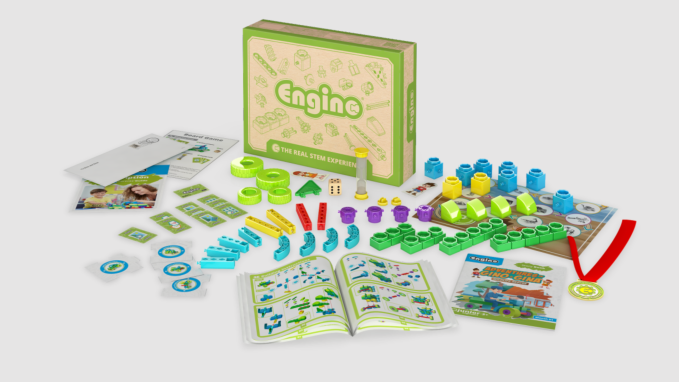
Image Credits: Engino
Cyprus-based Engino is offering this monthly subscription STEM kit for “junior engineers” — aged 3+. It’s a very gentle intro to STEM with a focus on physical building using colorful, snap-fit blocks. Packs are designed to encourage preschool children to develop their cognitive, social and motor skills through fun and creative play — with story and activity books included in the bundle to build narrative and interaction around the experience. This is certainly a lower tech toy but the product does include access to a 3D modelling app to add a virtual component to the building.
Discovery #Mindblown Early Engineers 88-Piece Building Set
Age: 3+
Price: $20.99
Buy here: Amazon
Here’s another intro to physical building from U.S. toymaker brand Discovery. Instead of a box of Lego-style bricks the kit contains a mix of components — from brackets and blocks to wheels, nuts, bolts and googling eyes on screws — and a universal ratchet tool so kids can have fun exploring design ideas and problem solving while fixing up different creations. Screen-free play.
Botzees Go Unicorn Set
Age: 3+
Price: $39.99
Buy here: Botzees Toys
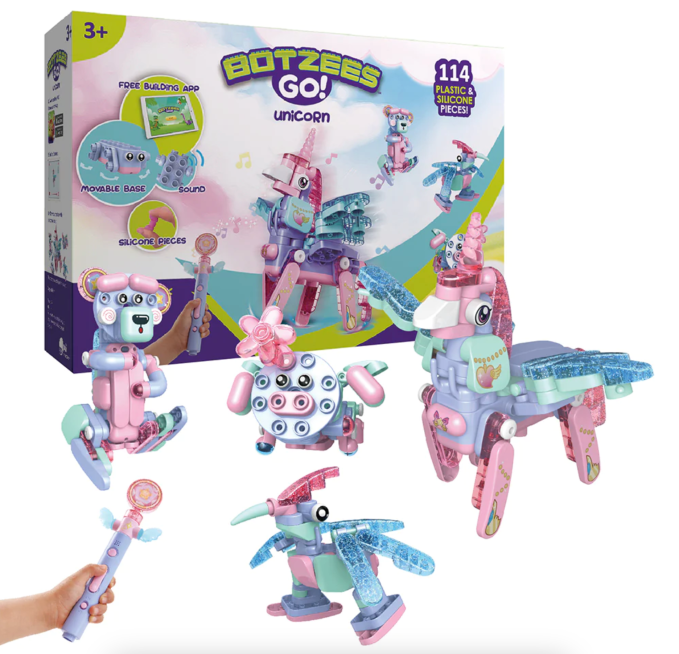
Image Credits: Botzees Toys
If you’re looking for a block-building STEM kit that’s not space rover themed this Botzees Go! Unicorn Set might be just the ticket. The pack of pastel colored blocks and glittery silicon pieces aims to encourage creative and exploratory play plus logic and problem-solving. Kids get to put together a range of cute characters — including electronic toys they can remote control with a battery-operated wand. A companion app provides building instructions for making pre-designed creatures, such as the unicorn robot — after which they can get to say they built their first unicorn.
Code & Go Robot Mouse
Age: 4+
Price: $33.99
Buy here: Learning Resources
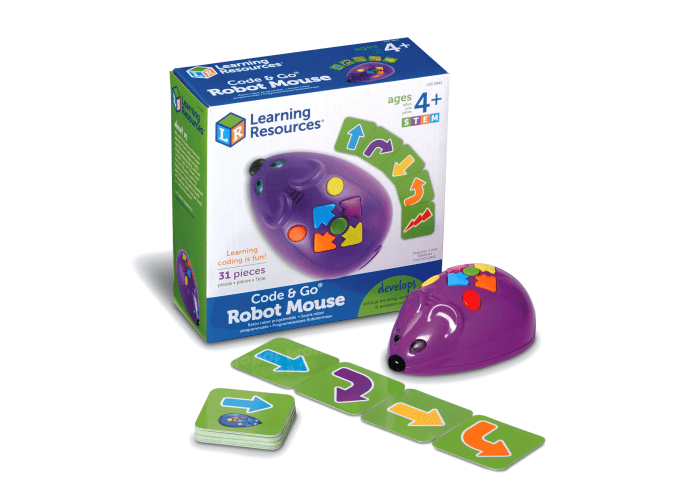
Image Credits: Learning Resources
For something a little more retro, what about a robot mouse? This fully programmable, battery-operated gizmo comes with a pack of double-sided coding cards to encourage kids to create step-by-step instructions for the bot and get an intro to basic coding concepts and critical thinking as they play around controlling sound, light-up eyes and movement. No screens necessary.
Space Rover Coding Activity Set
Age: 4+
Price: $44.99
Buy here: Learning Resources
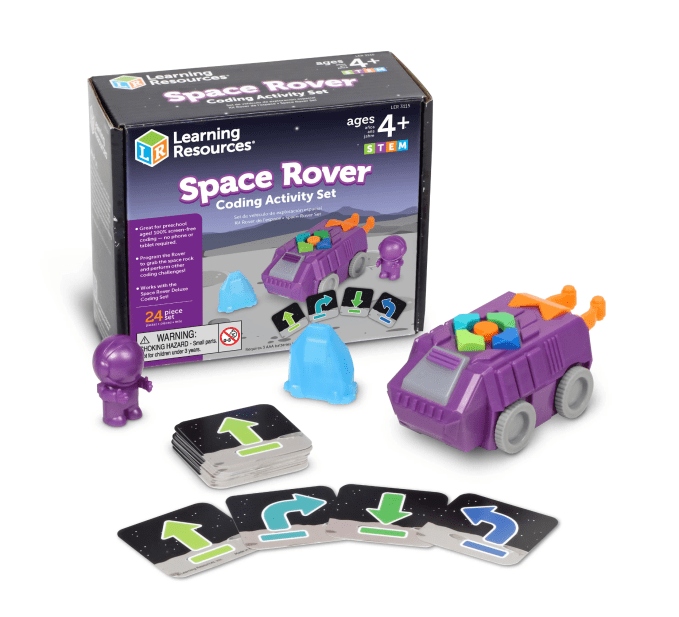
Image Credits: Learning Resources
On a similar screen-free tip, Learning Resources also ranges this Space Rover Coding Activity Set. Kids are encouraged to code sequences of directional instructions to get the battery-operated bot through customizable mazes and solve “dozens” of coding challenges using the set’s activity cards. The pack includes an astronaut and a space rock to incorporate into coding challenges.
Qboidz: Racing Car with 10 bonus models
Age: 4-7
Price: $74.99
Buy here: Engino
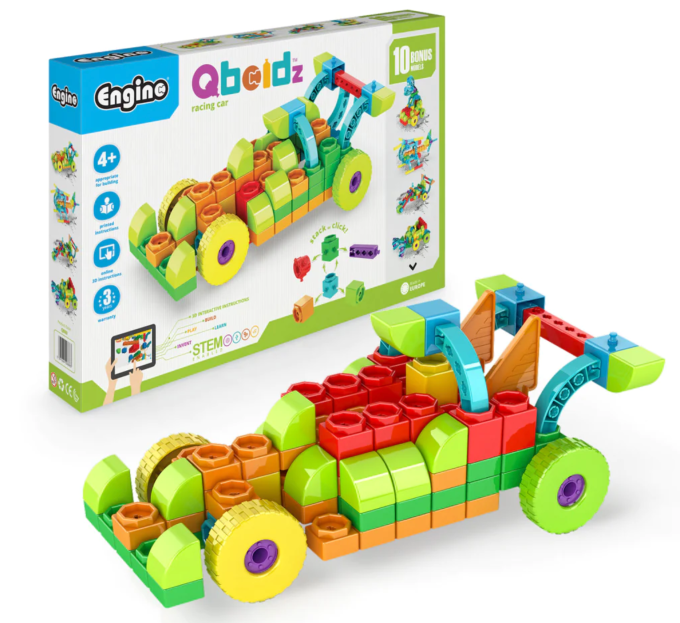
Image Credits: Engino
Also from Engino, this colorful Racing car kit, which uses its Qboidz block-building system for preschoolers, encourages youngsters to develop logic and spatial awareness through physical building play. The kit includes a range of other pre-designed models that can be clicked together — paper instructions are included in the kit. Or kids can refer to 3D “interactive” instructions available online for a gentle intro to 3D modelling.
Plugo Coding
Age: 4-10
Price: $69.99 (with gamepad playing base; NB: iPad/tablet not included)
Buy here: Amazon
If your gift recipient already has access to a tablet or (compatible) mobile device PlayShifu’s clever gamepad system puts that existing device into a blended AR learning arena that lets kids play with physical components in order to control virtual elements on screen.
Its Plugo Coding kit features a physical rack to slide and stack instruction tiles to create coding sequences, branches and loops and solve puzzles. Pulling down the red lever executes the code on screen as the physical play syncs — via the mobile device’s camera — with a series of block-based coding puzzle games.
The best STEM toys for ages 5-7+
Pixel Art Challenge
Age: 5+
Price: $19.99
Buy here: Learning Resources
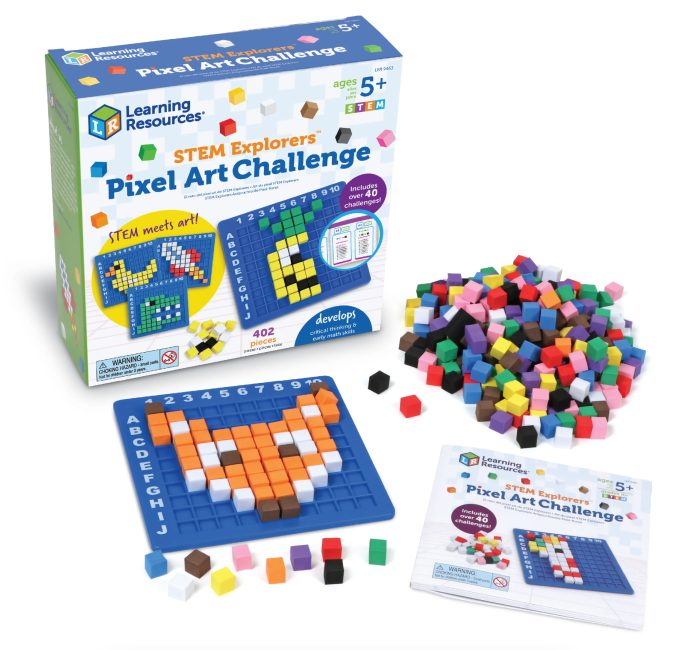
Image Credits: Learning Resources
Learning Resources’ Pixel Art Challenge kit combines solving math and coding problems with building 2-D pixel artwork — for a basic intro to STEAM concepts.
STEM Qboidz & Junior Robotics Set
Age: 5-7
Price: $269.99
Buy at: Engino
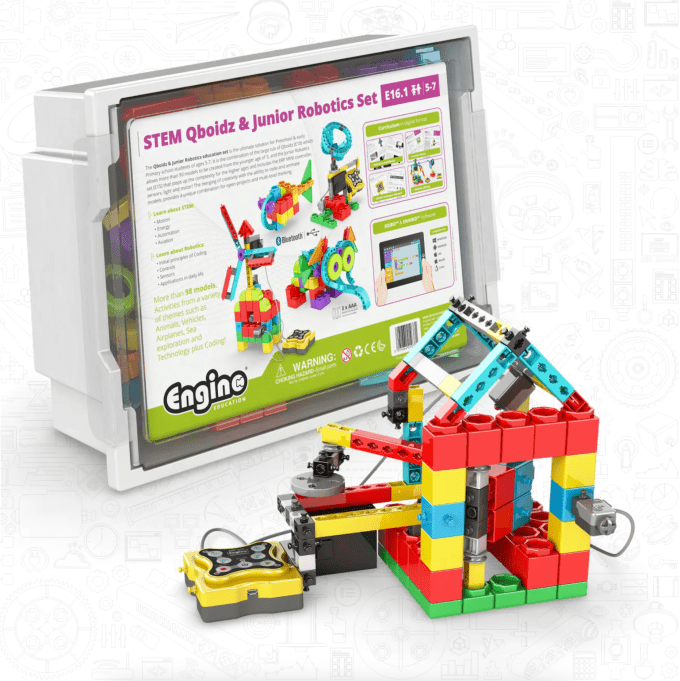
Image Credits: Engino
Youngsters won’t run out of stuff to build with this massive Qboidz & Junior Robotics Set, also from Engino. More than 90 models can be snapped together from the brightly colored bricks, with app-based instructions for 3D building also available (via Engino’s kidCAD app). But there’s more! The kit contains a Junior Robotics Set to further step up the STEM potential and complexity, bundling an ERP MINI controller, sensors, light and motor so kids can design and build functional robots. Engino’s system supports programmable robotics when you loop in its Keiro block-based coding platform.
The Offbits Jumbo Kit
Age: 6+
Price: $59.95
Buy at: OffBits
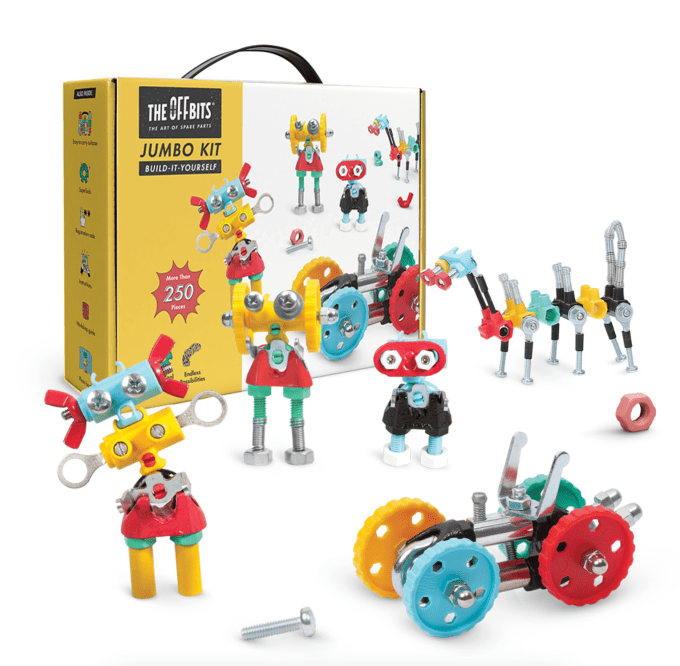
Image Credits: The OffBits
The OffBits’ Jumbo Kit is a STEAM-focused kit of robust bits and bobs (aka 250+ colorful nuts, bolts and “shapely bits”). The aim is to encourage kids to get imaginative and play around designing and building all sorts of creations, from wheeled vehicles to funky robots. It’s hands-on, screen-free play.
The twist on other builder kits is OffBits’ system is focused on repurposed components and spare parts, such as screws and wing nuts — nudging kids to think about how they can reuse all sorts of things to make something new. That looks good for problem solving and logic. And, as little hands deconstruct and reconstruct all sorts of imaginative physical designs, for developing a ‘zero waste’ mindset too.
Dash + Gripper Building Kit
Age: 6-11
Price: $219.98
Buy at: Wonder Workshop
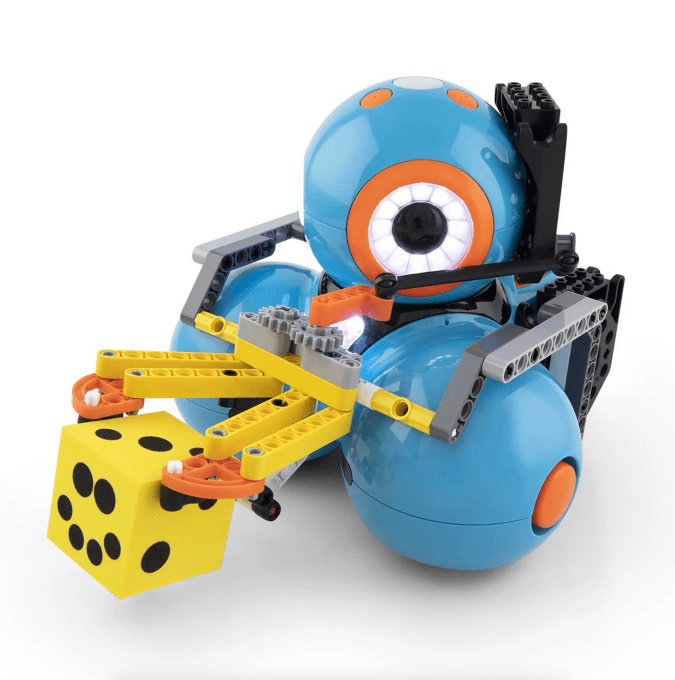
Image credits: Wonder Workshop
US-based category veteran Wonder Workshop has a big focus on the formal education market these days. But home users can still pick up its educational robot, Dash. This version of Dash comes with a Gripper Building Kit attachment. Once constructed the functioning arms can be programmed to grab and carry lightweight objects — extending the coding possibilities.
Wonder Workshops’ coding apps let kids control Dash, making it move, sing, dance, flash its lights, respond to voices, tell stories and generate sound effects. Its learning platform includes a drag-and-drop block-based coding app (Blockly); or — for a monthly subscription — they can step up to Blockly Pro which supports kids to transition from block-based graphical programming to JavaScript.
BBC Doctor Who HiFive Inventor Coding Kit
Age: 7+
Price: $68.26
Buy at: Tynker
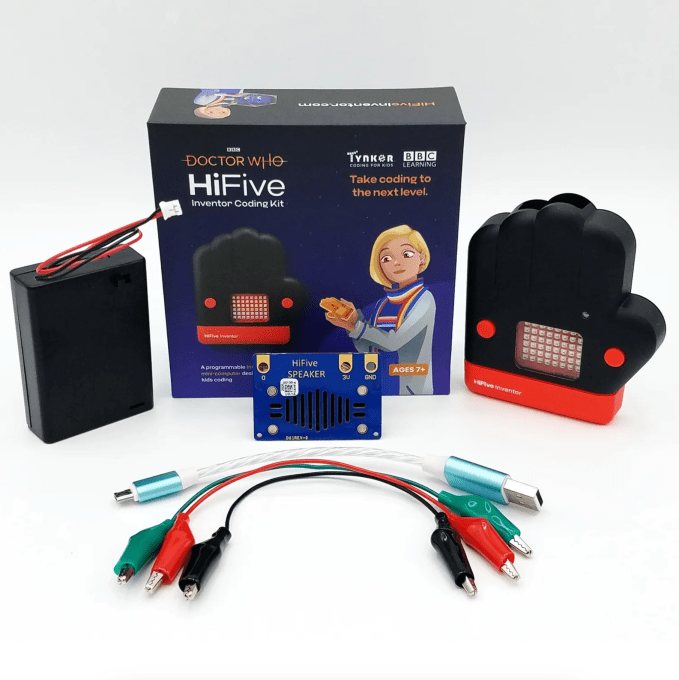
Image Credits: Tynker
Young fans of the BBC TV series “Doctor Who” will be tickled by this HiFive Inventor Coding Kit (ranged by Pimoroni). The programmable hand-shaped mini computer — which features an LED-matrix display, various sensors, switches, Wi-Fi and Bluetooth — is designed to inspire kids to engage with themed tutorials and coding projects, including the chance to build their own sonic screwdriver. The kit also includes a speaker module for programmable audio fun.
The product features thematic content narrated by actor Jodie Whittaker, aka the Thirteenth Doctor, who takes kids on an intergalactic coding journey where they get to undertake challenges like learning to program and pilot an alien spaceship, control a robot, and build an exotic musical instrument. The hardware is designed to work in conjunction with the Tynker visual block coding platform (for early learners). So access to an Internet-connected computer is a must. As kids gain experience they can also move on to MicroPython for more advanced programming projects.
The best STEM toys for ages 8+
Pyxel A Coder’s Best Friend
Age: 8+
Price: $124.99
Buy at: Educational Insights
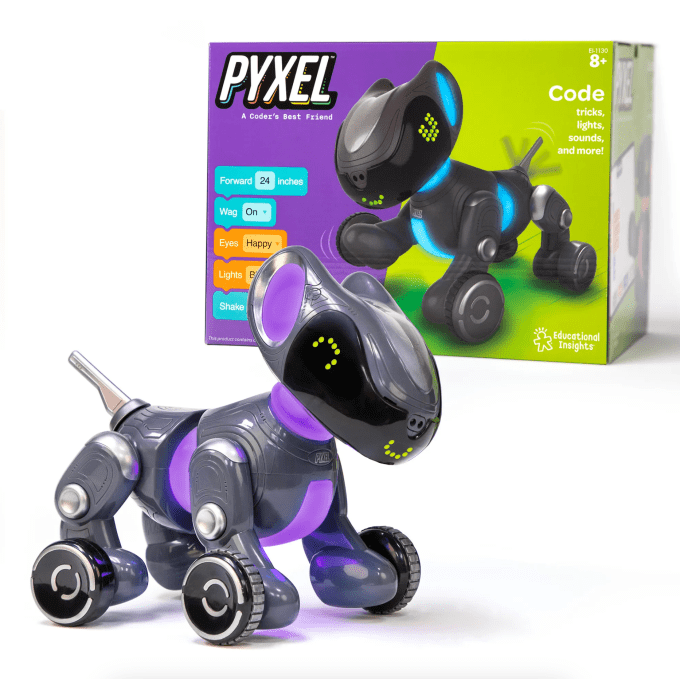
Image Credits: Educational Insights
What about inspiring youngsters to get into tech by gifting them their own programmable robot pet? Pyxel dials up the cute factor right out of the box: The four-legged wheeled canine bot has a range of expressive features kids can learn to control with code — from eyes that emote to a wagging tail. On-board sensors also enable it to react to touch and sound. The system supports beginner drag-and-drop coding, with Blockly. But as kids advance they can progress to Python coding. Access to a computer or tablet is required to program the bot.
Sphero Mini Robot Ball: Soccer Theme
Age: 8+
Price: $50
Buy at: Sphero
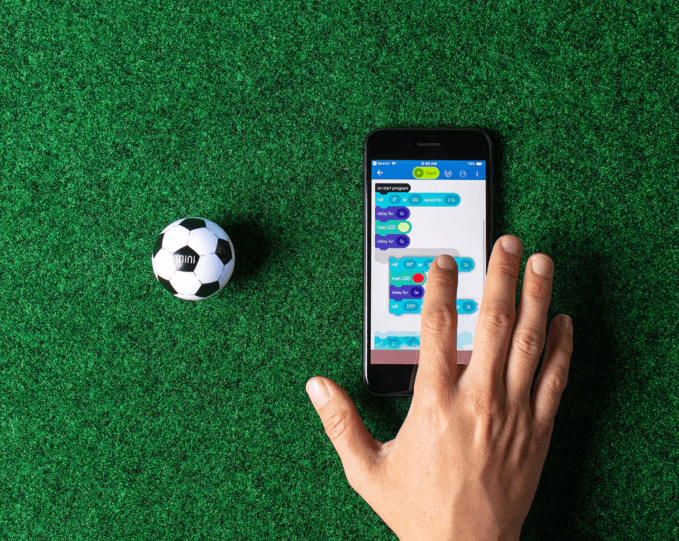
Image Credits: Sphero
Another STEM toy maker that’s rolled deep into the edtech market is Sphero. But it too still offers a selection of kit for home users. This product, the Sphero Mini Robot Ball: Soccer Theme, dresses its trademark tiny programmable robotic ball up as a soccer ball. Kids can have fun driving the football around to play at their own sports matches using the Sphero Play app — or tap into the programmable and educational element via the Sphero Edu which offers STEM games and other learn-to-code content. Requires access to a smart device.
littleBits Code Kit
Age: 8+
Price: $329
Buy at: Sphero
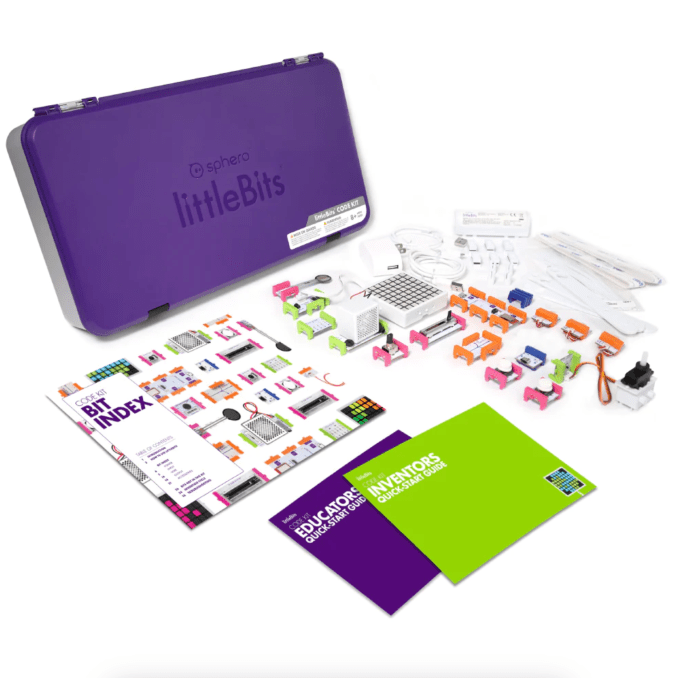
Image Credits: Sphero
Also from Sphero is the littleBits line: A hardware-based learning system for coding and electronics. This Sphero littleBits Code Kit is an all-in-one set of snap together electronics component blocks plus structured support (activities and lessons) — via Sphero’s Fuse app and littleBits Classroom — to get kids inventing by exploring programming and engineering concepts.
CyberPi Go Kit+ Somatosensory Game Coding Box
Age: 8+
Price: $89.99
Buy at: MakeBlock
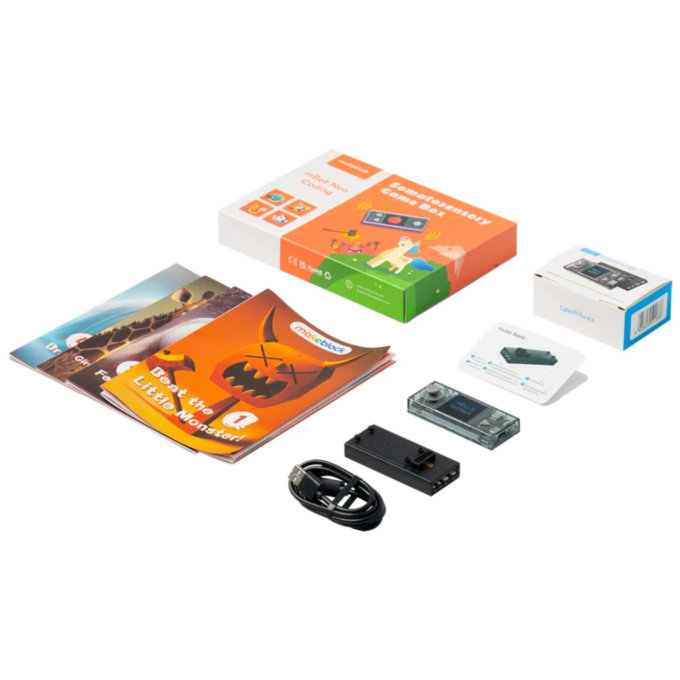
Image Credits: MakeBlock
This STEM kit by MakeBlock encourages kids to learn Block-based and Python coding by programming a mini games console-style multi-function microcontroller called the CyberPi. The full color-screen programmable learning hardware is bundled with a Somatosensory Game Coding Box to dial up the appeal for gamers and budding games designers. Requires access to a computer or smart device for programming the CyberPi.
Elecfreaks Nezha Inventor’s Kit V2 For micro:bit
Age: 8+
Price: $149 (without the micro:bit; or $239.70 with a micro:bit)
Buy at: Elecfreaks
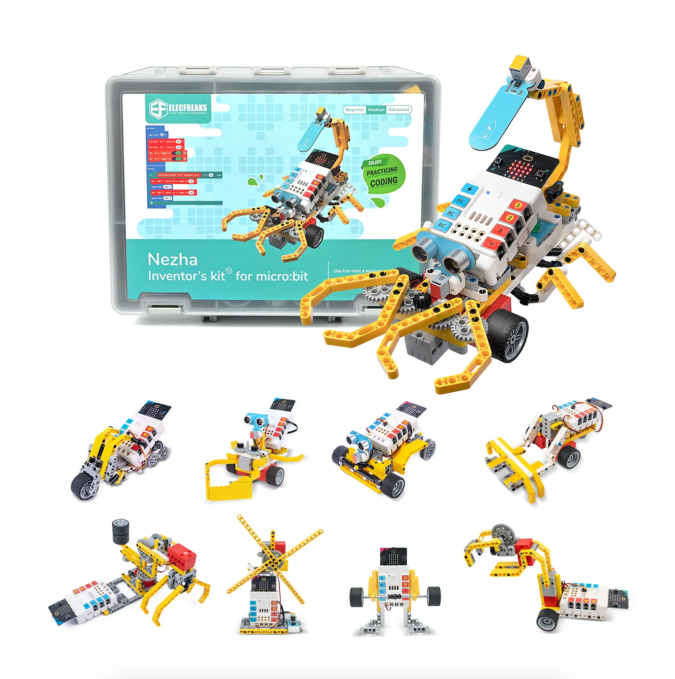
Image Credits: Elecfreaks
Another popular microcontroller in the learn-to-code space is the BBC micro:bit. STEM toy maker Elecfreaks are piggybacking on that and ranging this Nezha Inventor’s Kit V2 — a bumper pack of bits designed for young minds to get the most out of the microcontroller. The bumper brick-builder and robotics bundle includes a range of sensors and modules such as LED lights, potentiometers, soil moisture sensors, ultrasonic sensors, collision sensors and patrol sensors — letting kids create all sorts of custom gizmos.
The company sells a range of further add-ons too — such as this micro:bit AI Smart Lens Kit ($59.90) — which folds artificial intelligence models into the educational mix, allowing AI tech to be programmed graphically and applied to solve tasks like line-tracking, ball tracking, color identification and face tracking. Also requires PC or smart device access for coding the hardware.
Raspberry Pi 400 Desktop – Full Computer Kit
Age: 8+
Price: $100
Buy at: AdaFruit
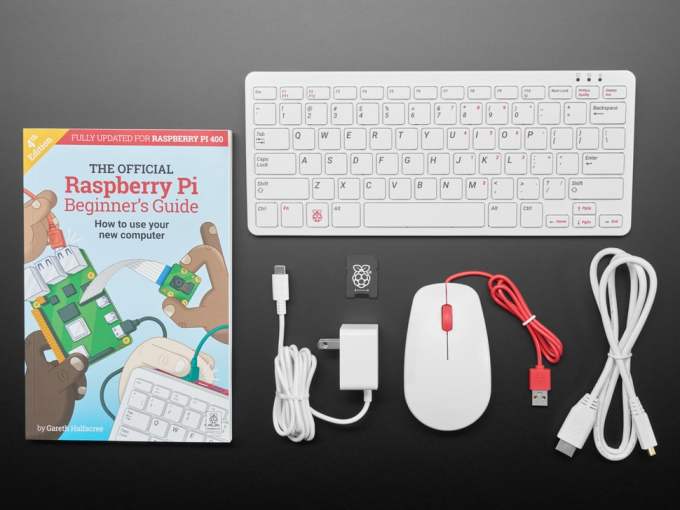
Image Credits: AdaFruit
Raspberry Pi is a category veteran so no STEM toys gift guide would be complete without a little slice of Pi. We’ve picked out this Pi 400 (computer-in-a-keyboard) computer kit, ranged by AdaFruit, which comes bundles with some handy extras — such as a Micro SD card with the Raspberry Pi OS (pre-burned on the card) and the Official Pi 4 USB Mouse Official Raspberry Pi beginners’ guide (a paper-based guide to programming in Scratch and Python, plus info on how to set up Pi).
To get this learning machinery up and running kids will need a few more bits — most notably access to a monitor or other compatible screen.
Buzz The Code Bug
Age: 8-10
Price: $117
Buy at: Let’s Start Coding
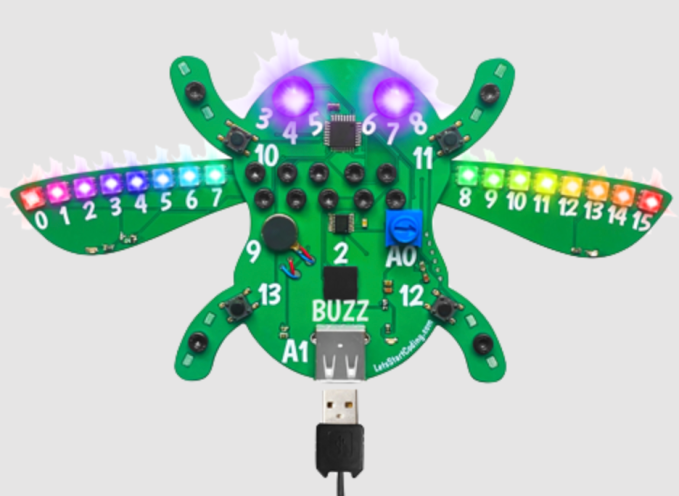
Image Credits: Let’s Start Coding
More programmable electronics ahoy: Let’s Start Coding are offering this bug-shaped board, Buzz the Code Bug, to inspire youngsters to knuckle down and grapple with coding challenges, projects and bug hunts. The bundled educational content covers basic C++ coding concepts like variables, functions, syntax, statements and styling. Again, access to an Internet-connected PC is required to plug into the coding software.
Bots! by Kathy Ceceri – Book and Parts Bundle
Age: 9-12
Price: $49.85
Buy at: AdaFruit
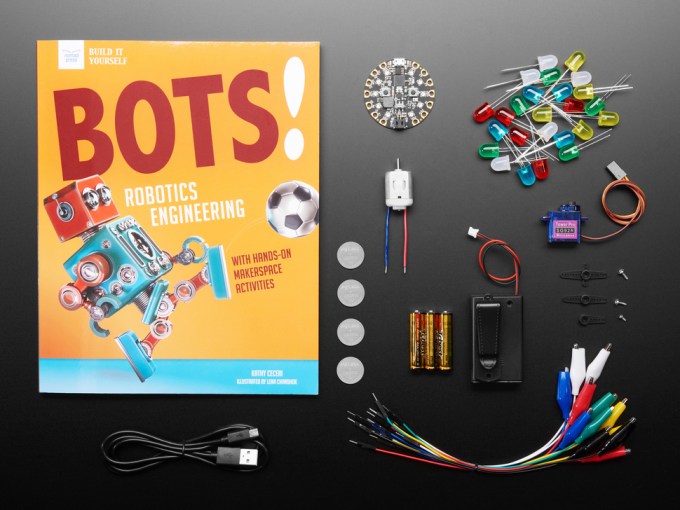
Image Credits: AdaFruit
If your child likes reading and being hands on, here’s another AdaFruit robotics bundle which might inspire them to make like an engineer: “Bots! Robotics Engineering with Makerspace Activities for Kids” is written by STEAM education expert Kathy Ceceri. AdaFruit have paired her book with a selection of beginner-friendly electronics components so budding builders can get tinkering as they read. No soldering necessary.















































